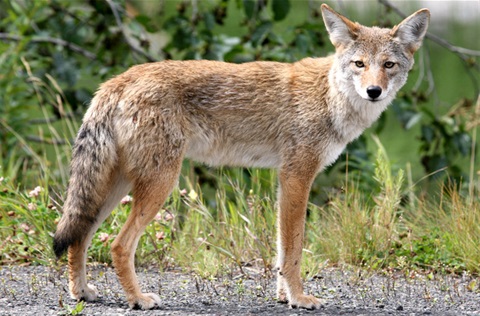Coyotes & other wildlife

Coyotes, opossums and raccoons have all adapted over the years to suburban life in California. Lakewood residents experience occasional visits from local wildlife and during springtime these visits may become more frequent, as this is the breeding season for many wild animals.
Below are helpful tips to discourage wildlife activity at your home and neighborhood.
Coyotes
Coyotes in the wild are by nature fearful of humans. However, they are highly adaptive and can lose their fear of humans when we provide them with food, shelter or water sources. To reduce the number of coyotes in the city requires us all to do our part to eliminate these coyote attractants.
While Lakewood doesn’t have the level of coyote problems of many communities near foothills or large open-spaces, coyotes can venture into residential areas in our city and become problematic, especially if people are feeding them (intentionally or unintentionally) by leaving pet food out overnight, tree fruit on the ground, or trash unsecured. These coyote attractants also create a threat to pets, as coyotes coming into neighborhoods see them as potential prey. Coyotes can kill cats and small dogs who are left unattended or who stray off your property.
The California Department of Fish and Wildlife provides helpful tips for communities and asks for our cooperation.
Tips to keep coyotes away and keep your pets safe
- Eliminate any potential food source, such as dishes of cat food. Food attracts coyotes, putting your pets at risk.
- The safest place for your cats and small dogs is inside. Coyotes can jump over fences 6-10 feet high. While coyotes generally hunt between sunset and sunrise, they have been sighted at all hours of the day.
- Fence off animal enclosures (fully enclosing is best). Keep your property well lit. Motion sensors are helpful.
- Never feed coyotes! (When humans are bitten by coyotes it is often because someone in the area is feeding coyotes and it breaks down their natural fear of humans.) Feed pets inside.
- Clean areas around bird feeders. Loose seeds attract rats and other rodents (a food source for coyotes as are small animals).
- Pick up fallen fruit (another food source for coyotes and for animals and rodents that attract coyotes).
- Keep trash lids securely closed. Don’t overfill trash cans so they can’t close fully. Coyotes can reach in and get food. This teaches them to come to your home.
- Wash trash containers periodically with a deodorizer like ammonia. If possible, take trash out the morning of pick-up.
- If you compost, use enclosed bins. Do not compost meat, dairy or egg products.
How to handle a coyote encounter
- While walking dogs, keep them on a leash 6’ or shorter. Walk your dog at times and places that coincide with high pedestrian traffic or walk with another person. Keep your dog close to you and be aware of your surroundings. If alone and you encounter a coyote while walking your dog, remain calm, take control of your dog by picking it up if possible and back away slowly, keeping your eyes on the coyote. Look for another pedestrian to assist you.
- Use negative reinforcement ("hazing") to train coyotes to stay away.
- If you see a coyote, let it know it’s not welcome in your neighborhood by making loud noises to frighten it away. You’re helping the coyote by keeping it wild and safe…and you’re helping protect your neighborhood.
- Stand tall, wave your arms, and yell or make noise with pots/pans, whistle, etc.
- Spray the coyote with a garden hose.
- Don’t ignore or run away from a coyote. You need to scare it away, but don’t injure it or it could become unpredictable.
How to report a coyote sighting
To report a coyote sighting use the city's main online service form or call 562-866-9771, extension 2140.
With any concerns about coyotes, you may also want to report the sighting to the Department of Fish and Wildlife (DFW) at 562-342-7100 during business hours (or 888-334-2258 after 4:30 p.m.) since the DFW oversees wildlife regulations in California.
Opossums
Opossums are resistant to most diseases including rabies and do not present a health hazard to people. Opossums are non-aggressive, extremely slow and while they may show teeth and growl, they will not attack dogs, cats or humans but if cornered or threatened they may defend themselves.
Opossums actually help to keep a clean and healthy environment by eating over-ripe fruit, all types of insects and garden pests.
In addition, the Opossums Society of the United States, a non-profit organization, provides information about possums. They can be contacted at OSUS@OpossumSocietyUS.org.
Raccoons
SEAACA does not encourage the trapping, removal or relocation of raccoons.
Raccoons have been known to carry disease and can be aggressive. They are best avoided.